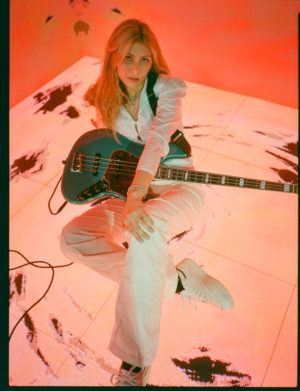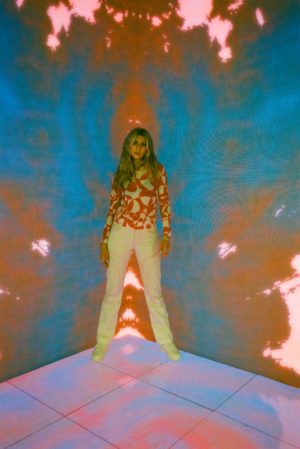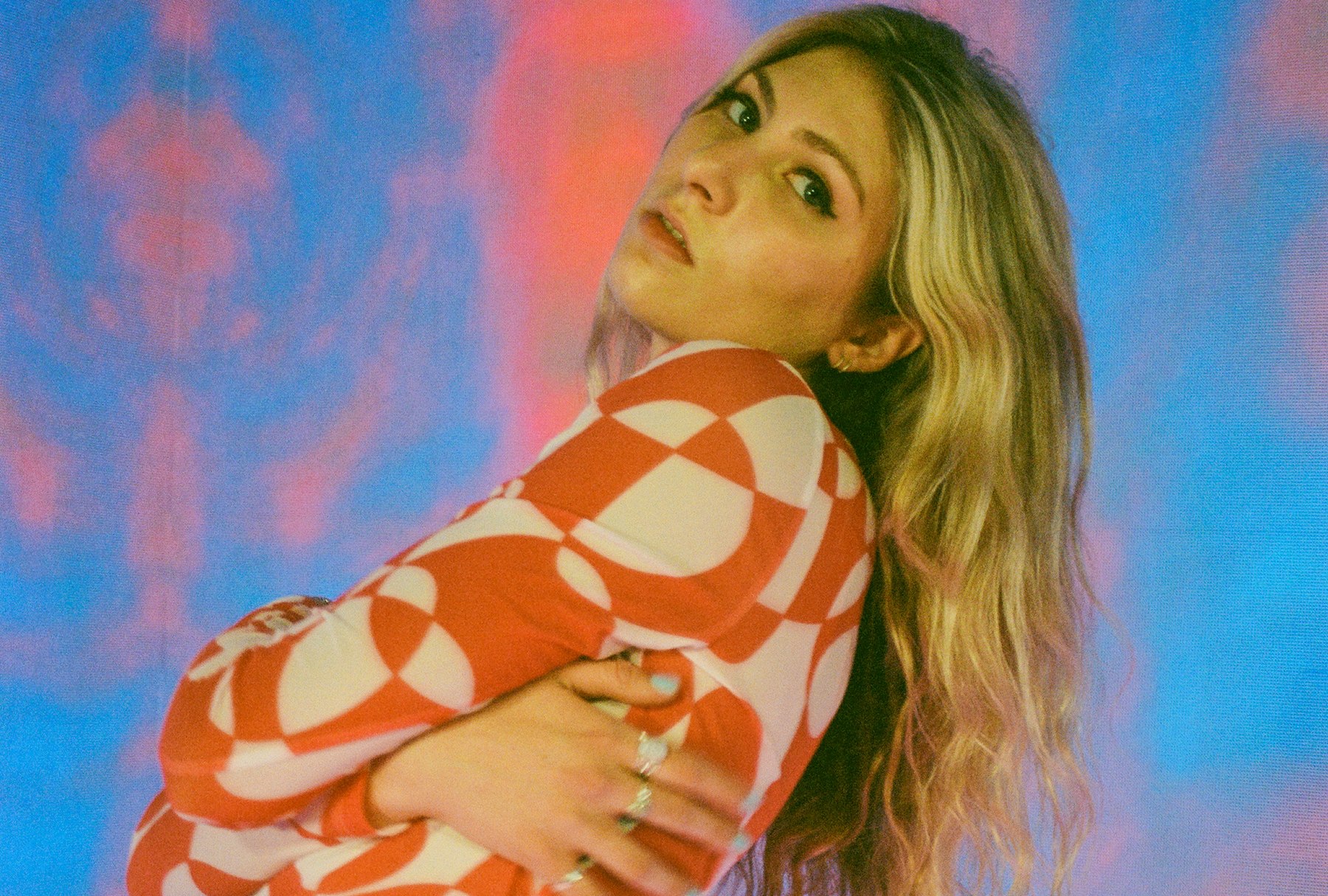Blu DeTiger creates funk-pop songs that try to make sense of the absurdity of New York City. On her single “Vintage,” she uses the city’s glamorous magnetism to help find the perfect accessory for her latest look: “I need a vintage boy for my outfit,” she cheekily sings. “Always holds the door / But I found him in the mosh pit.” She pokes fun at the young millennials who know all the words to The Killer’s classic “Mr. Brightside.” Elsewhere, she chooses rooftop parties and club bathrooms for intimate synth-heavy disco. “My heart beats on the roof on the corner of Canal Street,” she sings on the twilit “Night Shade.”
DeTiger’s weapon of choice is the bass, which she’s been playing since she was a child. She says she’s been writing songs for a while, playing in bands for hire, but didn’t really get excited about releasing her own music until she started DJing. When she played at clubs, she’d bring her bass along and improvise to her choices for the dance floor. She’d heard about DJs who’d bring along their trumpet or saxophone and thought the bass wouldn’t be much different. “It’s all music, it should all go together,” she says. “I love DJing and I love bass…why don’t I just do them at the same time.”
Now that being inside the majority of the time is our new reality, DeTiger has taken advantage of TikTok, where she posts videos of covers and bass playing tutorials, and improvises to songs as if she would in a club—only now her support is virtual. “I think that’s kind of the only way to connect with fans these days. It makes it way easier,” she says of the app. “What’s been really cool about the whole TikTok thing is having people say that they’re now inspired to pick up the bass or guitar or whatever and start playing music. I’m so stoked that anyone has felt inspired by me.”
As a bonafide New Yorker, the musician takes pride in her hometown and made it a focal point on her debut EP How Did We Get Here. Written both before and during quarantine, these seven tracks are playful with a melancholic undercurrent. “A lot of it deals with nostalgia and my time in New York and thinking about those fun times I had. All of those quarantine feelings of loneliness and nostalgia,” she says over the phone. “Pretty much all of the songs are kind of like describing these memories that I miss of ‘the before times,’ or me thinking ahead to the future and what I’m hopeful for.”
Read our full chat below.
Can you tell me about how the EP came together?
I have a home studio. A bunch of songs I wrote before quarantine, so a few of them were done at my friend Eugene’s studio. He produced a few of the songs. Then most of them I worked on at home with my brother in my home studio during peak pandemic, like not even going outside. I would stay inside for two weeks straight. Then I went back and I tracked all the vocals with this amazing vocal producer named Jenna Andrews. She has a little studio in New Jersey, so I went there to track the vocals. It was all done in the New York area, which is really cool because I pride myself on being a straight up New Yorker. All the collaborators and producers on this EP are New York people, so that felt really cool to me to keep it in the family.
How is it working with your brother?
We used to have this group together called BITS that was really tongue-in-cheek, funny songs like Lonely Island style—well, more serious than that but it was really cheeky. We had a few songs we did together and it was really fun. Now he co-produces and co-writes my stuff.
“We have that telepathic sibling thing. It’s nice when you’re brother and sister and you can say it how it is and not get the other person’s feelings hurt. If I don’t like something I can be like, ‘I don’t like that,’ and there’s no sugarcoating anything.”
We’re pretty different as people, but we have that telepathic sibling thing. It’s nice when you’re brother and sister and you can say it how it is and not get the other person’s feelings hurt. If I don’t like something I can be like, ‘I don’t like that,’ and there’s no sugarcoating anything. He can say it to me, too, like ‘You can do it better.’ We can talk really openly and honestly to each other. Then when we’re writing songs he can more easily help me formulate because he knows me so well. But also he’s a drummer, so he has that skill set that I don’t have, all the cool drum programming and beats.
“Vintage” is a fine line of describing real people and scenes in New York, but also flipping the objectification of women that’s common in songs. There’s a sense of a real crowd in NYC with a satirical edge.
Yeah, totally. It’s kind of like that mix of making fun of it, but admitting that I’m part of it and into it. Which is a cool juxtaposition. Kind of flipping those roles. That song is super funny, but it’s super real. It’s very much on the nose of me describing these people I’ve met.

I’d love to hear more about quarantine in New York and what you miss most about it pre-pandemic.
First of all, dancing and going out and stuff. Not that I miss partying, because I’m not really a partier, but missing the dance floor. I was DJing a lot before the pandemic as well. That’s another one of my passions—I really miss doing that. One of my favorite feelings is DJing in New York clubs. It’s such a scene. I really, really miss that. Then obviously, you know, seeing my friends and stuff, but that kind of comes hand-in-hand with doing some outings and stuff like that.
I haven’t been on a plane in a year, which is really weird because I was used to being on planes like every two days before. I definitely really miss that, obviously, playing live shows and performing. I wish I could be doing that right now, but I know it’s gonna come back so I’m not not crazy worried. It’s just holding out until it does.
Can you tell me more about how you got into DJing?
“I was able to hear the songs I really like every night I was DJing and then use those as references for when I went to write my own music. Knowing what songs get people on the dancefloors is obviously helpful when you go to write songs that are maybe trying to do that same thing.”
I was intrigued by it for a long time. And then I met one of my mentors, JP Solis, and he taught me how to DJ and everything. I got really into the technique of it and the actual skill of it, like transitioning, picking songs, interacting, and reading a room. Then I kept doing it and doing it. I was bringing my bass around to all my DJ sets, which kind of set me apart from everyone else. I was getting booked a lot because of that, because it’s so niche and weird. People really liked that around the city, so I kind of became known for that. Which definitely made me a better musician in general because I was shredding to these pop songs. Which meant that I had to improvise over these songs that I didn’t know. Learning it on the fly really trains your ear to be better.
Having that vast knowledge of music, through the decades—you have to know all the hits through every decade. You got to know what makes people move, what makes people get on the dancefloor, and also what makes people get off the dancefloor at the end of the night. You really figure out which songs affect people in different ways. Learning how to control the crowd is a really special skill that DJs learn. That was cool because when I went back into writing my own stuff I had a big group of songs to reference, songs that I really loved. I was able to hear the songs I really like every night I was DJing and then use those as references for when I went to write my own music. Knowing what songs get people on the dancefloors is obviously helpful when you go to write songs that are maybe trying to do that same thing, then you know which elements include.

It’s its own crash course in music history.
Totally! You know so much music. Also, in a general sense, doing the DJ thing really inspired me to actually start my project because I love DJing and playing other people’s music, but I was always craving dropping my own music in there. When I was performing I was just like, ‘Oh shit, I really want to put my own stuff on right now.’ So then I was like ‘OK, well I gotta go make it.’ I was always writing songs and playing with bands and stuff, but I didn’t have that urge to have my own songs that I did under my own name until I was in that scene. The DJ stuff really led me on that path as well.
Who are the performers that inspire you?
Bernard Edwards is probably my favorite player. He plays with Nile Rodgers in Chic. I learned all of his bass lines when I was getting into funk bass. In terms of singing and artistry, I love Debbie Harry from Blondie. I think she’s the coolest and gives off such a sick vibe even in her vocal style. I love Tina Weymouth from Talking Heads. St. Vincent, in her artistry, in her visuals, and how she does her live shows is really, really cool. She’s an amazing guitarist as well.
The bass is an integral part of the song, but it can be peripheral at least on a stage. Usually the bassist isn’t front and center. I’m interested to hear your thoughts of performing in a band versus shifting to the center with your own music.
That’s one of the reasons why I fell in love with the bass, because it holds it down for everyone. The bass and drums, the groove, that’s what gives a song its center. But when I started to get really into it I realized the bass can be so much more. I think a lot of people don’t realize that. When I was playing with some bands, I was trying to showcase that as well. I think people started to notice, too. I would be touring with other bands and pick up a bunch of fans and followers just from that, because they would see the bass in a new light. I was also kind of going crazy on stage instead of standing in the back.
When I write my own stuff, I’m trying to bring the bass to the forefront. All my songs have really prominent bass lines, which is because that’s how I express myself the best. That’s the instrument that I learned music on, and that’s how I feel music. Also, I’m trying to showcase that it can be the groove part and also the melody part and also the rhythmic part. I think that’s also kind of what I’ve been doing on TikTok or Instagram with these little cover videos, showcasing what the instrument can do. People are reacting positively to it because they didn’t realize that it could do that. FL








